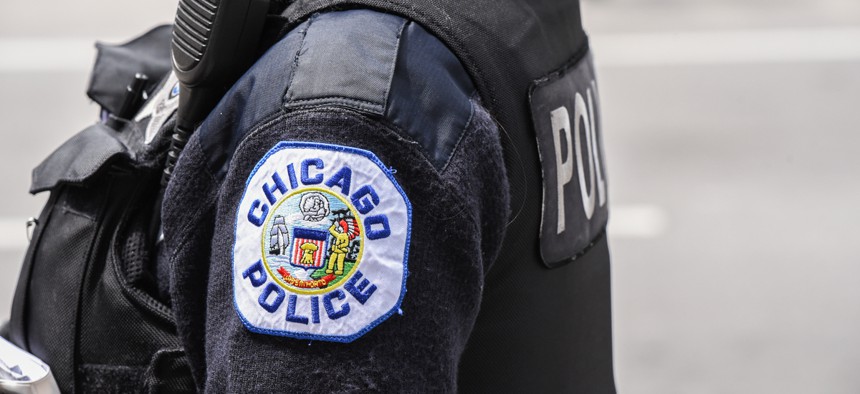Chicago Police Will Monitor Social Media in Response to Looting

Chicago police at a recent protest. Shutterstock
"Social media platforms have repeatedly been used to organize large groups of people to engage in illegal activity," said Mayor Lori Lightfoot.
Chicago Mayor Lori Lightfoot announced that the city has created a police task force to monitor social media activity about looting. The task force is composed of 20 people within the city’s Crime Prevention and Information Center, a division of the Chicago Police Department that aims to “detect, prevent, investigate, and respond to criminal and terrorist activity.”
The announcement came after widespread looting and vandalism in Chicago’s downtown area last week. Lightfoot condemned the looting as “straight-up felony criminal conduct.”
The looting was sparked by misinformation spread through several viral videos. Last Sunday, Chicago police shot a 20-year-old Black man in the city’s Englewood neighborhood, but widely-circulated videos claimed a 15-year-old had been shot and killed. Police on the scene did not initially dispute the misinformation, which led to frustration and looting, activists say.
Black Lives Matter Chicago said that the anger directed towards the city after the killing of “yet another Black man” was “justified.”
“Black lives are and always will be more important than downtown corporations,” the group said in a statement. “The mayor cannot expect people to play by her rules as she refuses to treat them with basic dignity.”
In the immediate aftermath, the city raised bridges over the Chicago River, shut down expressway entrances and exits, and suspended public transit service for the night. On Friday, Lightfoot and police superintendent David Brown said that they plan to employ “every legal tactic necessary to protect retail throughout the city,” including social media monitoring.
"As we've seen over these past few months, social media platforms have repeatedly been used to organize large groups of people to engage in illegal activity," Lightfoot said.
The task force is monitoring posts that talk about looting and violence. If they see plans for any potential crime, police officers will be “deployed immediately” to block off the area. “We will do everything we can to stop you, and we will arrest you,” Brown said. “If you get away from us, we will work with our state and federal partners to find you, and we will arrest you.”
The move was swiftly condemned by community groups like United Working Families. The “doubling down on police crackdown and surveillance … makes it tragically clear that Mayor Lightfoot is … [putting] property and profits before people,” the group said in a statement.
Chicago is not the first city to monitor social media activity in response to protests or looting. Police in Northern California have used a regional intelligence center to stay on top of Black Lives Matter protests throughout the region recently. In Philadelphia, photos posted to social media were used in an investigation to determine who had set fire to a police vehicle in May; after comparing photos of suspects to their social media profiles, six arrests were made in August. Federal agents also monitored social media and YouTube livestreams during protests in Portland, Oregon to find posts that referenced an intent to “damage or destroy any public monument, memorial, or statue.”
Widespread social media monitoring of protesters also occurred in 2014 and 2015 after police shot and killed Michael Brown in Ferguson, Missouri, sparking nationwide protests similar to those seen after the death of George Floyd in Minneapolis this year.
When the ACLU released a report about the practice in 2016, they warned that social media monitoring was “spreading fast” and is “a powerful example of surveillance technology that can disproportionately impact communities of color.”
In a statement emailed to Route Fifty, Colleen Connell, executive director of the ACLU of Illinois, said that “social media monitoring by law enforcement holds a number of dangers, including chilling protected speech and opening the door to authorities targeting people based on protected speech, race, association, and neighborhood.” She called for Chicago to be “fully transparent” about the new task force’s work going forward.
Emma Coleman is the assistant editor for Route Fifty.
NEXT STORY: Cellphone Data Shows How Las Vegas Is 'Gambling With Lives' Across the Country






